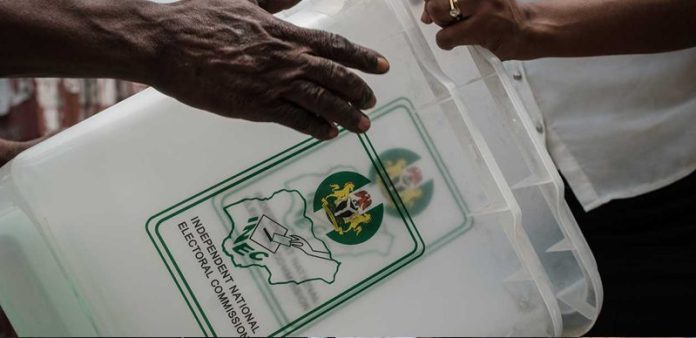A new report released by Kimpact Development Initiative has revealed inconsistencies in the electoral process during the 2024 governorship elections in Edo and Ondo States, with discrepancies in vote counts and data released by the Independent National Electoral Commission.
The report, which revealed discrepancies between the figures recorded on the INEC Election Result Viewing portal and those officially declared at the state collation centres, showed that the All Progressives Congress gained 40,871 more votes, while the Peoples Democratic Party lost 10,680 votes.
During the public presentation of the document titled “Ballot Integrity Report for the 2024 Edo and Ondo State Governorship Elections” in Abuja, the non-governmental organization, known for advancing good governance and democratic rights in Nigeria, said the variations raise important questions about the transparency of the collation process, particularly concerning unreported election cancellations and disparities in vote counts at different stages of collation.
The study found that in certain Local Government Areas in Edo, figures declared by INEC showed significant deviations from those recorded on the IReV platform.
For instance, the report showed that in Akoko Edo LGA, APC received 9,912 more votes in INEC’s declared results compared to IReV figures, while in Oredo LGA, APC gained an additional 13,393 votes.
However, the document pointed out that PDP’s vote count was lower in INEC’s declared results compared to IReV in Ikpoba/Okha (4,898 fewer votes) and Oredo (4,223 fewer votes).
“The overall vote count discrepancies between IReV and INEC results show that APC had 40,871 votes more in the INEC-declared results compared to IReV, while PDP had 10,680 fewer votes in the INEC-declared results compared to IReV,” the report stated.
Although the discrepancies did not change the overall winner of the elections, the report said they significantly altered the margin of victory.
Recall that Monday Okpebholo of the APC polled 291,667 votes to defeat his closest challenger and candidate of the PDP, Asue Ighodalo, who scored 247,274 votes.
The document pointed out that INEC’s declared margin of lead was 44,393 votes, whereas the margin based on IReV data was significantly lower at 8,064 votes.
With 22 polling units uploading Form EC40, indicating that elections were either canceled or did not hold in those areas, the total number of registered voters in these affected polling units was 13,942, with 11,917 PVCs collected.
Given that the number of canceled votes exceeded the margin of lead based on IReV figures, the report suggested that the election may have met the conditions for a supplementary election under electoral guidelines.
Another revelation from the report is the inconsistency between the number of registered voters recorded in Form EC8A at certain polling units and the figures released by INEC before the elections.
These mismatches, according to the document, call into question the accuracy of voter registration records and the overall integrity of the electoral process.
Analysis by KDI found that in Edo State, discrepancies appeared in locations such as the Enwan/Atte/Ikpeshi/Egbibele Registration Area (RA) in Akoko-Edo LGA and the Ogida/Use RA in Egor LGA.
In Ondo State, mismatches were recorded in polling units in Oke Aro/Uro I RA in Akure South LGA and Iluabo/Eleyewo/Bolorunduro RA in Akure North LGA.
A further review of IReV portal and official voter registration records, according to the document, indicated that the issue affected 141 out of 4,519 polling units in Edo State and 87 out of 3,933 polling units in Ondo State.
Beyond the polling unit-level mismatches, the report found that inconsistencies persisted at the state collation centres, where results from all Local Government Areas were aggregated.
In Edo State, the total number of registered voters announced at the state collation centre was 18,340 fewer than the pre-election figures provided by INEC.
Similarly, in Ondo State, mismatches were also detected at the final collation stage.
The report also revealed that a total of 28,083 ballots were unaccounted for in Edo State, while Ondo State recorded 12,931 missing ballots.
Addressing journalists after presenting the report, KDI Executive Director, Bukola Idowu, said the inconsistencies observed suggest potential administrative errors, data entry lapses, or other factors that could undermine public confidence in the electoral process.
While acknowledging INEC’s improvement in uploading results to IReV compared to the 2023 general elections, he urged the commission to address these irregularities ahead of the upcoming governorship elections in Anambra, Ekiti, and Osun, noting that Nigerians expect a more transparent process by 2027.
Professor of Political Science, Adele Jinadu, said that although there are inconsistencies during elections, he cautioned against dismissing the entire process due to human error.
According to him, elections are complex undertakings, and mistakes can occur, but the key question should be whether they are deliberate or incidental, saying, “That is why the law allows INEC to review declared results within seven days.”
He further noted that in Commonwealth nations, including Nigeria, the principle of substantial compliance is used in election jurisprudence.
The don said the issue should be whether the errors are significant enough to alter the declared results, adding that the burden of proof rests on petitioners who must present clear evidence.
“Flaws are inevitable, but citizens must be proactive in monitoring elections at the polling unit level. Electoral governance requires a ‘night watchman’ approach, where people organize to safeguard the integrity of the process,” he said.

